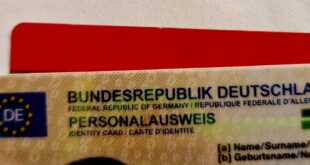A German man insults an African colleague at work by calling him a monkey and he was dismissed. Deeming his dismissal a violation of his right to free expression, the man went to court to challenge it. Germany’s highest court on constitutional matters has now delivered a landmark verdict on racist insults against people of African descent versus the right to freedom of expression in Germany
—-
Racist expressions are not covered by the right to freedom of expression, Germany’s top court has ruled.
Addressing a Black colleague with “ugah, ugah” therefore justifies immediate dismissal, the Federal Constitutional Court, sitting in Karlsruhe, decided in a ruling published on Tuesday, 24 November.
Background to the case
During a meeting of the worker’s council (Betriebsrat) of the company, a dispute arose over the handling of the computer system. The dispute was apparently fierce during which the complainant, a German man, addressed a Black worker’s council colleague with “ugah, ugah“.

The German man was dismissed – which is a delicate matter, especially for a worker’s council member. Aggrieved over the decision of his employer, he went to the Labour Court to challenge it and lost. He appealed the ruling at the next judicial instance, the Regional Labour Court, which confirmed the lower court’s decision. Because he felt his freedom of opinion was restricted by the ruling, the German appealed again to the Federal Constitutional Court, the country’s highest on constitutional matters.
“Fundamentally degrading”
The constitutional court ruled that the man could not invoke its right to freedom of opinion in this case. To address a Black person with monkey sounds was not simply a crude insult, but “fundamentally degrading”.
The judges in Karlsruhe emphasised that the Basic Law, Germany’s constitution, not only protects freedom of opinion, but also protects against racial discrimination.
“According to this constitution, human dignity is infringed when a person is addressed not as a human being but as a monkey”.
Moreover, the case apparently has a history, it was not the first such statement made by the dismissed man in the company. He had already received a warning letter from management for a similar reason in the past, which, according to the constitutional judges, remained “ineffective” to correct him.
Against this background, the employer had a duty to protect the discriminated colleague (the Black person) and the dismissal protects him from further racist attacks, which, the judges make clear, are an attack on a fundamental right: human dignity.
The court’s ruling (Reference number: 1 BvR 2727/19) is a landmark victory for people of African descent in Germany who are often exposed to racist insults but find it difficult to seek protection under the law. Now, it has become established by the country’s top court on constitutional matters that racist insults are a violation of the victims’ human dignity.
This judicial victory for anti-black racism struggle in Germany should give more strength to activists who are currently campaigning for the legal classification of the N-word as a racist insult.
The state constitutional court of Mecklenburg-Western Pomerania, one of Germany’s 16 federal states, had ruled on 19 December 2019 that the N-word could only be considered derogatory depending on the context in which it is used, in effect giving legal backing to the use of the historically insulting word.
The controversial verdict sparked protests by the Black community across the country and an online petition on change.org for the legal classification of the N-word as racist (Rechtliche Anerkennung dass der Begriff „Neger“rassistisch ist!), which has been signed by more than 155,000 supporters.
Sola Jolaoso
READ ALSO Germany’s Black community says NO to N-word at Cologne rally
 THE AFRICAN COURIER. Reporting Africa and its Diaspora! The African Courier is an international magazine published in Germany to report on Africa and the Diaspora African experience. The first issue of the bimonthly magazine appeared on the newsstands on 15 February 1998. The African Courier is a communication forum for European-African political, economic and cultural exchanges, and a voice for Africa in Europe.
THE AFRICAN COURIER. Reporting Africa and its Diaspora! The African Courier is an international magazine published in Germany to report on Africa and the Diaspora African experience. The first issue of the bimonthly magazine appeared on the newsstands on 15 February 1998. The African Courier is a communication forum for European-African political, economic and cultural exchanges, and a voice for Africa in Europe.



































